Moving to Brazil brings exciting opportunities, but understanding local systems is key. The country offers a dual approach to medical services—public and private. SUS, the public system, serves 72% of residents with free care. Meanwhile, private facilities handle 62% of hospitals, often preferred for shorter wait times.
Nearly 50.7 million Brazilians use private insurance for faster access. COVID-19 vaccination rates hit 98% for adults, showing strong public efforts. Expats should weigh options based on needs and budget.
Beyond medical care, adapting to culture matters. Portuguese is essential outside tourist areas. Warm weather and vibrant social customs shape daily life. Planning ensures a smooth transition.
Key Takeaways
- SUS provides free care but may have long waits.
- Private options cover 62% of hospitals.
- Over 50 million locals use private insurance.
- COVID-19 vaccination rates are exceptionally high.
- Learning Portuguese helps in daily interactions.
Understanding Brazil’s Healthcare System
Brazil’s medical framework blends universal access with premium private options. Whether you’re settling long-term or visiting, knowing how these systems work ensures you get the right care.
The Role of SUS (Sistema Único de Saúde)
SUS is a constitutional right, offering free services to all residents. It covers everything from emergency visits to chronic disease medications. Infant mortality rates dropped sharply thanks to SUS programs—from 53 to 12 deaths per 1,000 births since 1990.
Strengths include robust vaccination drives and free prescriptions for conditions like diabetes. During Covid-19, 98% of adults received at least one dose. Telemedicine became permanent in 2022, helping rural areas.
Private vs. Public Healthcare Options
Private facilities excel in speed and convenience. Plans cost $200–$500 monthly, with English-speaking staff at top networks like Rede D’Or and Sírio-Libanês. Albert Einstein Hospital in São Paulo ranks among Latin America’s best.
Public clinics shine in cities but struggle in remote regions. For expats, weighing wait times against costs is key. Tip: Combine SUS for basics and private insurance for specialists.
Healthcare and Lifestyle in Brazil: What Expats Need to Know
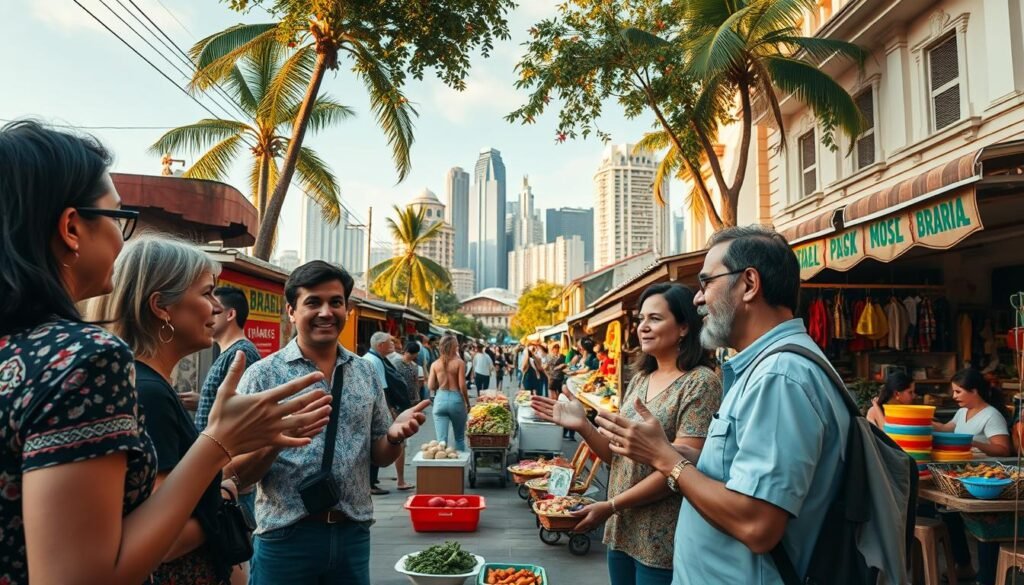
Navigating medical services as an expat means balancing local customs with practical needs. Over half of physicians work in just five states, creating uneven access nationwide. Whether you’re in São Paulo or the Amazon, preparation ensures smoother cultural adaptation.
Language and Local Nuances
Learning basic Portuguese medical terms helps bridge gaps. Public clinics rarely have English speakers. Phrases like “dor de cabeça” (headache) or “febre” (fever) build trust with providers.
Embrace jeitinho brasileiro—a flexible problem-solving approach. Staff may prioritize cases based on relationships. A smile and patience go further than rigid expectations.
Regional Disparities
Quality varies sharply by location. The Southeast boasts 55% of physicians, while the North struggles with shortages. Private networks like Rede D’Or cluster in urban hubs.
| Region | Hospitals per 100k People | Specialist Availability |
|---|---|---|
| Southeast | 3.2 | High |
| North | 1.1 | Low |
Tech and Daily Wellness
Apps like Dr. Consulta offer same-day appointments. For food safety, stick to bottled water and well-cooked meals. Public tap water isn’t always reliable.
78% of hospitals focus on general medicine. For specialized conditions, research facilities ahead. Expat forums share reviews on English-speaking dentists or pediatricians.
Access to Healthcare Services Across Regions
Where you live in Brazil dramatically impacts your medical options. Urban hubs like São Paulo boast 136 hospitals, while Amazonas has just 27. This uneven distribution means your access to care hinges on location.
Urban vs. Rural Healthcare Disparities
In São Paulo, 24/7 specialty clinics and Saúde na Hora (extended-hour public clinics) are common. Contrast this with Amazonas, where basic care dominates. The Southeast has 80.5% access to doctors—the North lags at 69.1%.
Rural municipalities often lack emergency services. Telemedicine apps like Docway bridge gaps, but internet reliability varies. “Preventive care is scarce outside cities,” notes a 2023 health ministry report.
Best Regions for Expat Healthcare
For reliable access, prioritize these areas:
- São Paulo: Top private networks (Rede D’Or) and bilingual staff.
- Rio de Janeiro: Strong SUS support alongside premium options.
- Brasília: High physician density (3.2 per 100k people).
Northeastern interiors have limited resources—stick to capitals like Recife for critical needs. The South leads in public pharmacy distribution, easing medication pickup.
Cost of Healthcare for Expats
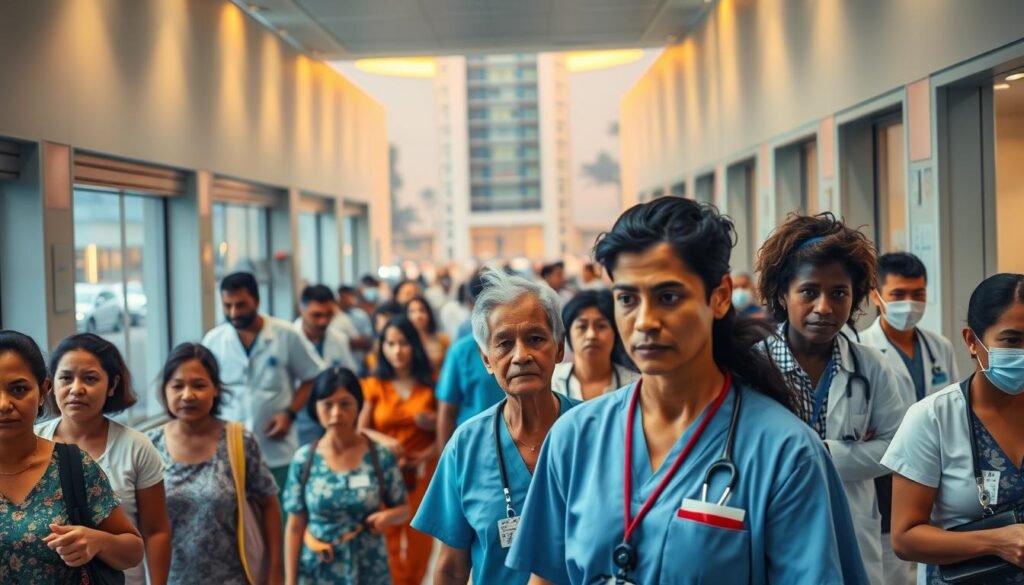
Budgeting for medical services is a top priority when relocating to Brazil. The country’s dual-system approach means expenses range from zero to thousands, depending on your choices. Here’s how to navigate the cost of healthcare effectively.
Public Healthcare: Free but Limited
SUS offers zero-cost care, but waits for non-emergencies can stretch for months. Expats need a CPF number (tax ID) to enroll, regardless of visa type. While prescriptions and vaccinations are free, specialist referrals require patience.
Projected SUS spending averages $1,000 per capita annually. For complex needs, public healthcare may fall short. “Rural clinics often lack basics like X-ray machines,” notes a 2023 health ministry report.
Private Insurance: Costs and Coverage
Plans from providers like Bradesco Saúde or Unimed start at $200/month. Tiered options include:
- Enfermaria: Shared rooms, lower premiums ($50–$150/month).
- Apartamento: Private rooms, broader coverage ($300–$500/month).
Watch for coparticipação—a 10–30% cost-sharing fee per service. Pre-existing conditions often face 24-month waiting periods. ER visits run $50–$300 privately versus free under SUS.
Major cities like São Paulo have higher fees. A GP visit averages $55, while specialists charge up to $130. International plans with English support cost $500–$8,000 yearly but offer seamless care.
Quality of Medical Care in Brazil
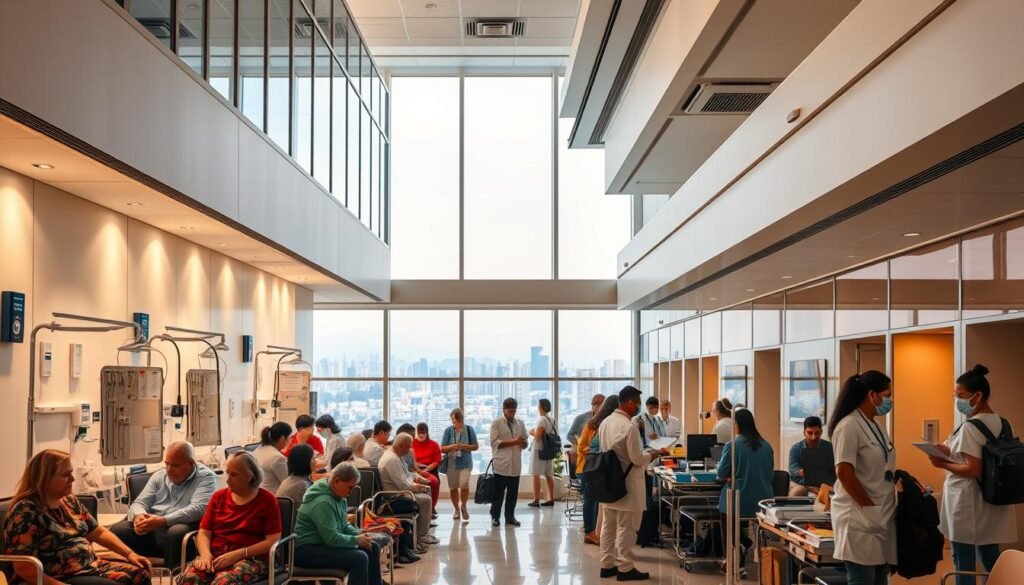
Expats often wonder how Brazilian hospitals compare to global standards. The answer? It’s a mix of cutting-edge centers and under-resourced clinics. While the country ranks 125th in WHO evaluations, pockets of excellence exist—especially in urban hubs.
Hospitals and Specialized Care
Brazil boasts 6,500+ facilities, with 70% of beds in the private sector. For top-tier quality, seek JCI-accredited names like:
- Albert Einstein Hospital (São Paulo): Ranked #1 in Latin America.
- Oswaldo Cruz (Recife): Pioneering cardiac research.
These centers rival U.S. standards, offering PET-CT scans and robotic surgery. Public units excel in trauma care but may lack specialists. “Wait times drop sharply under ‘Lei dos 60 Dias,’ guaranteeing treatment within two months,” notes a health ministry bulletin.
Challenges in Equipment and Resources
Advanced equipment clusters in major cities. Rural areas face shortages—only 1.1 hospitals per 100k people in the North. Public pharmacies often run low on chronic disease meds, forcing patients to private alternatives.
Dental care shines nationwide, but physiotherapy standards vary. For expats, the takeaway is clear: prioritize cities with JCI hubs for complex needs.
Primary Care and Family Health Programs
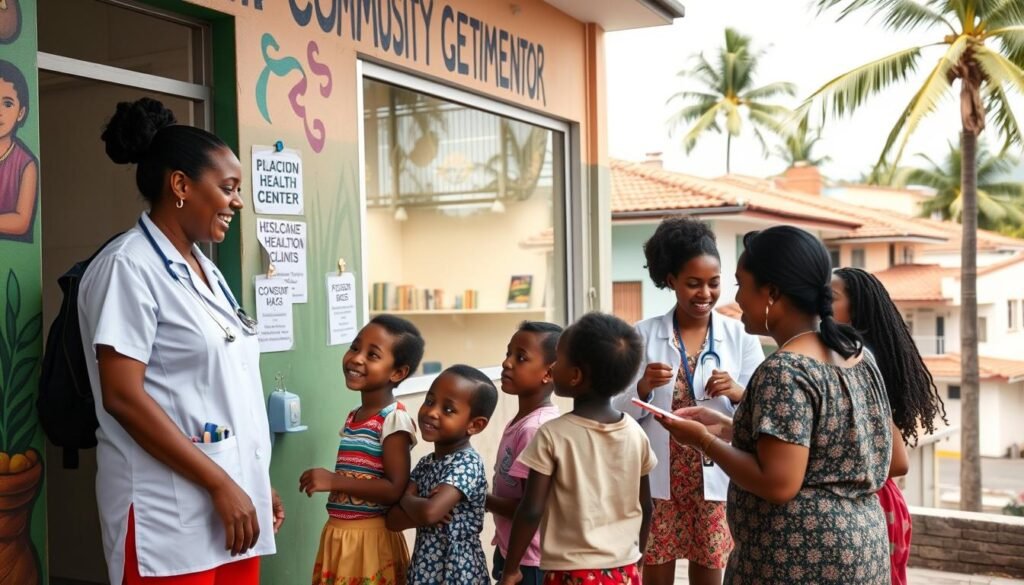
Family-focused medical programs form the backbone of Brazil’s preventive care network. The Estratégia Saúde da Família (ESF) is a community-driven model with 45,000+ teams nationwide. Since 1990, it slashed infant mortality by 77%—from 53 to 12 deaths per 1,000 births.
ESF units operate like neighborhood hubs. Each team includes doctors, nurses, and Agentes Comunitários (community agents). These workers visit homes monthly, tracking pregnancies or chronic conditions like diabetes. “They’re the eyes and ears of the system,” says a Recife health director.
Preventive Services You Can Access
Primary care under SUS covers:
- Prenatal checkups: 6+ free visits with ultrasounds.
- Diabetes monitoring: Blood tests and nutrition counseling.
- Vaccinations: Mandatory shots for polio, yellow fever, and HPV.
Community agents also teach hygiene and disease prevention. In rural areas, they deliver malaria nets or arrange ambulance transfers.
Limitations for Expats
While ESF excels locally, English support is rare. You’ll need basic Portuguese to discuss symptoms. Private clinics like Dr. Consulta offer bilingual GPs for $30–$80 per visit.
Tip: Download the Cartão SUS app to find nearby units. Bring your CPF number to enroll.
Navigating Language Barriers in Healthcare
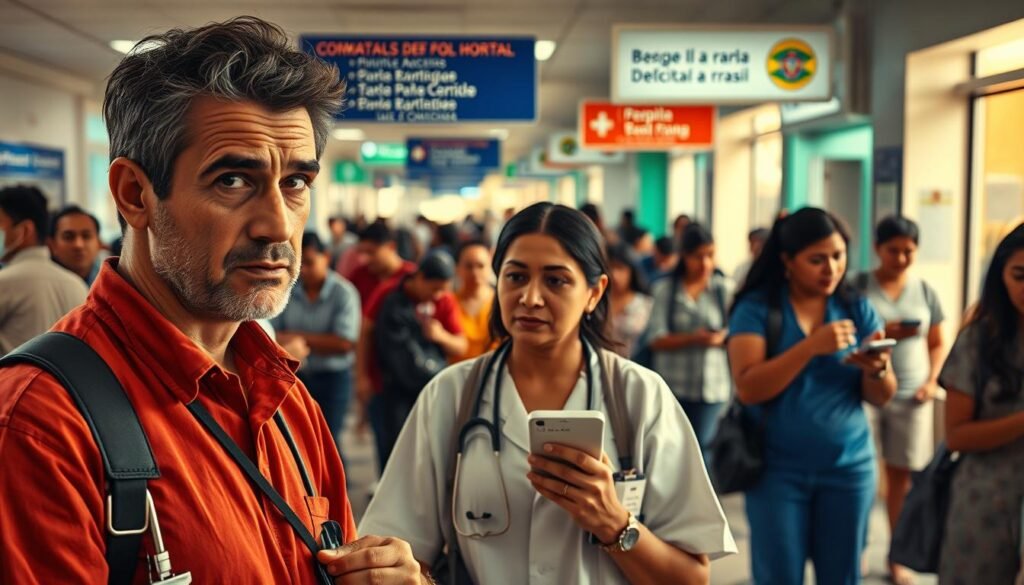
Breaking through language barriers ensures smoother medical visits in Brazil. Only 5% of physicians speak English fluently, and 90% of prescription labels use Portuguese. With the right tools, you can access services confidently.
Essential Tools for Communication
Download apps like Medibabble or Canopy for instant translations. These cover symptoms, allergies, and medications. For critical information, carry a translated medical history with your Cartão SUS (national health card).
Key phrases to memorize:
- “Alergia” (allergy)
- “Pressão arterial” (blood pressure)
- “Dor no peito” (chest pain)
Bilingual Clinic Networks
Major cities offer English-friendly services. Here’s where to go:
| City | Clinic Network | Specialties |
|---|---|---|
| São Paulo | Hospital Sírio-Libanês | General, Cardiology |
| Rio de Janeiro | Rede D’Or | Emergency, Pediatrics |
| Brasília | DF Star | Dental, Dermatology |
Note: Regional slang varies. In the Northeast, “cafuné” means head scratch—not a medical term! Double-check descriptions with staff.
Community health workers often assist with translations. Building rapport helps—Brazilians value warmth and eye contact during consultations.
Cultural Adaptation for Expats
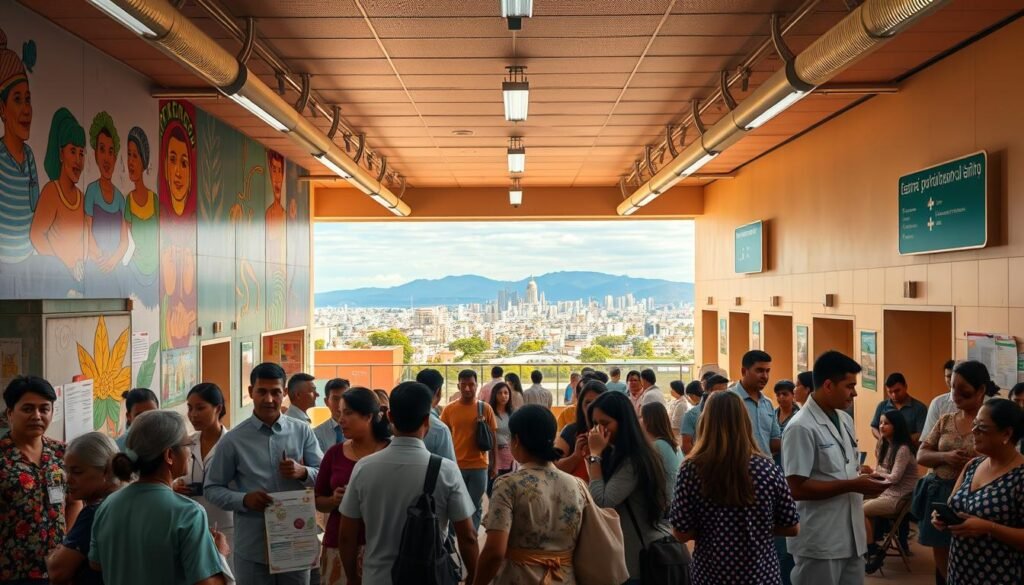
Cultural awareness transforms how you access services in Brazil. Over 50 million locals prefer private systems for personalized care, valuing relationships as much as treatment. The public SUS network even includes 29 integrative therapies, like acupuncture, reflecting holistic views.
Brazilian Attitudes Toward Wellness
Expect a blend of modern and traditional approaches. Herbal chá (tea) often complements prescriptions. Spirituality also influences perspectives—many providers discuss faith’s role in healing.
Physical touch, like a hand on your shoulder during consultations, signals empathy. “Brazilians connect through warmth,” notes a Rio clinic director. This expressiveness builds trust but may surprise those from reserved cultures.
Tips for Building Trust with Providers
- Gifts: Small tokens like chocolates are appreciated. Cash is inappropriate.
- Flexibility: Appointments often start late (horário brasileiro). Patience is key.
- Language: Learn phrases like “Estou me sentindo mal” (I feel unwell).
For expats, blending these norms with your needs eases the transition. SUS clinics may lack English support, but a smile and effort go far.
Vaccinations and Preventive Care
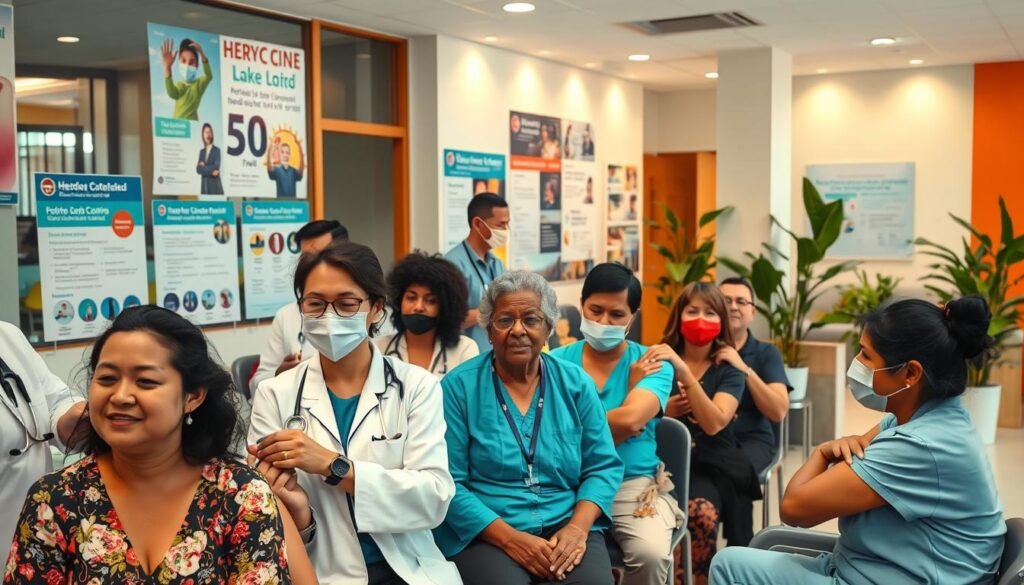
Staying healthy in Brazil starts with smart preventive care. Tropical climates and urban hubs pose unique risks, but the right preparations keep you safe.
Essential Vaccines
Brazil requires or recommends these vaccinations:
| Vaccine | Where Needed | Notes |
|---|---|---|
| Yellow Fever | Amazon region | Free at SUS clinics |
| Hepatitis A/B | Nationwide | Hepatitis A more common |
SUS provides free HPV shots for teens, though coverage dropped 1.5x since 2017. Expats should update records before arrival.
Dengue and Mosquito Safety
Brazil’s warm weather fuels mosquito-borne diseases. Prevent dengue by:
- Using EPA-approved repellents (DEET 20%+).
- Wearing long sleeves in dawn/dusk hours.
- Staying in screened or air-conditioned rooms.
“Community agents distribute mosquito nets in high-risk areas, but urban outbreaks still spike in summer.” —Health Ministry Report
Cancer Screenings and Rabies
SUS offers free mammograms and PSA tests. Book early—wait times average 3 weeks. For animal bites, rabies post-exposure shots are available at public units.
Travel clinics in Rio or São Paulo provide English-speaking advisors. Rede D’Or hospitals also handle last-minute needs for expats.
Mental Health Support for Expats
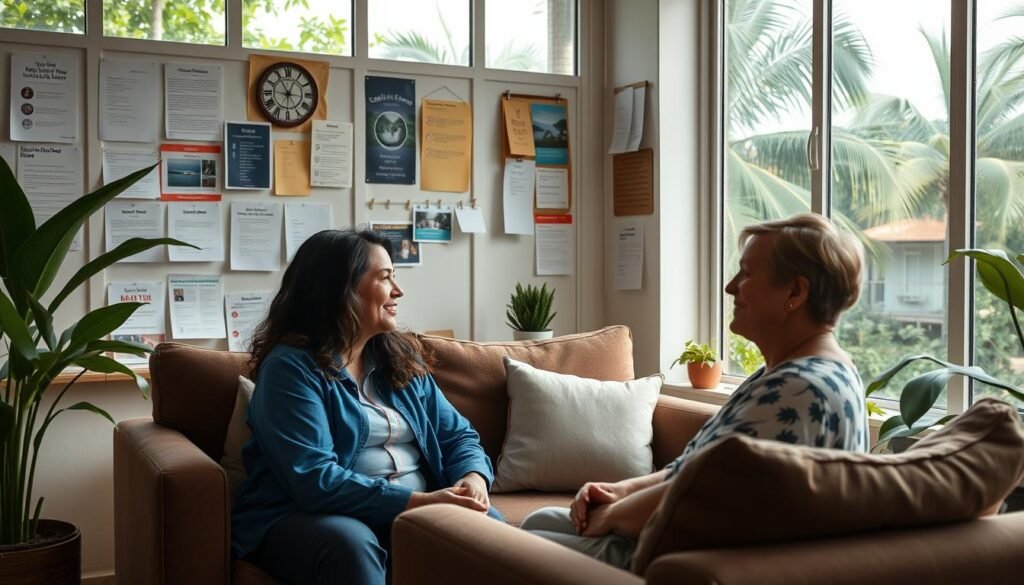
Finding reliable psychological support can ease your transition to Brazil. With 41% of locals reporting pandemic-related anxiety, understanding local resources is key. Only 1 psychiatrist serves every 10,000 people, so planning ahead matters.
For English-speaking help, try platforms like Vittude or Zenklub. These connect you with licensed therapists via video calls. Public options exist too—Centro de Atenção Psicossocial (CAPS) offers free community-based care for crises or long-term needs.
Cultural attitudes toward mental health vary. Depression may be stigmatized, but awareness is growing. Expat support groups in São Paulo or Rio share trusted providers. “Many Brazilians view therapy as a last resort,” notes a Rio psychologist.
- CBD oil: Legal with a prescription for anxiety or chronic pain.
- CAPS units: Focus on holistic care, not just medication.
- Hotlines: Dial 188 for suicide prevention (Portuguese-speaking).
Adjusting to life abroad brings challenges. Prioritize self-care and lean on communities. Private sessions start at $50/hour—check if your insurance covers them.
Daily Life and Wellness in Brazil

From açaí bowls to beach workouts, Brazil offers unique ways to stay healthy. With a 34% adult obesity rate, locals balance indulgence with 6,000+ public fitness centers. Whether you crave tropical superfoods or sunrise soccer, adapting to local habits boosts well-being.
Fueling Wellness with Local Flavors
Brazil’s healthy eating scene thrives on superfoods. Try antioxidant-packed açaí (unsweetened), vitamin-rich cupuaçu, or protein-heavy baru nuts. Watch for hidden sugars in “sucos naturais”—some blends add syrup.
For organic finds, visit:
- CEAGESP São Paulo: Latin America’s largest market.
- Feira do Lavradio: Rio’s trendy weekend spot.
| Superfood | Benefits | Where to Buy |
|---|---|---|
| Açaí | Antioxidants, energy boost | North region markets |
| Cupuaçu | Vitamin C, skin health | Amazonas vendors |
Embracing Brazil’s Active Culture
The tropical climate demands smart routines. UV indexes often hit 11+—wear SPF 50 and seek shade from 10 AM–2 PM. Stay hydrated with coconut water, not sugary sodas.
Social activities double as workouts:
- Beach volleyball: Free courts dot Rio’s shores.
- Capoeira: Dance-like martial arts in Salvador.
“Academias da Saúde parks provide free equipment, but locals prefer soccer or samba workouts.” —São Paulo Fitness Report
Emergency Services and SAMU
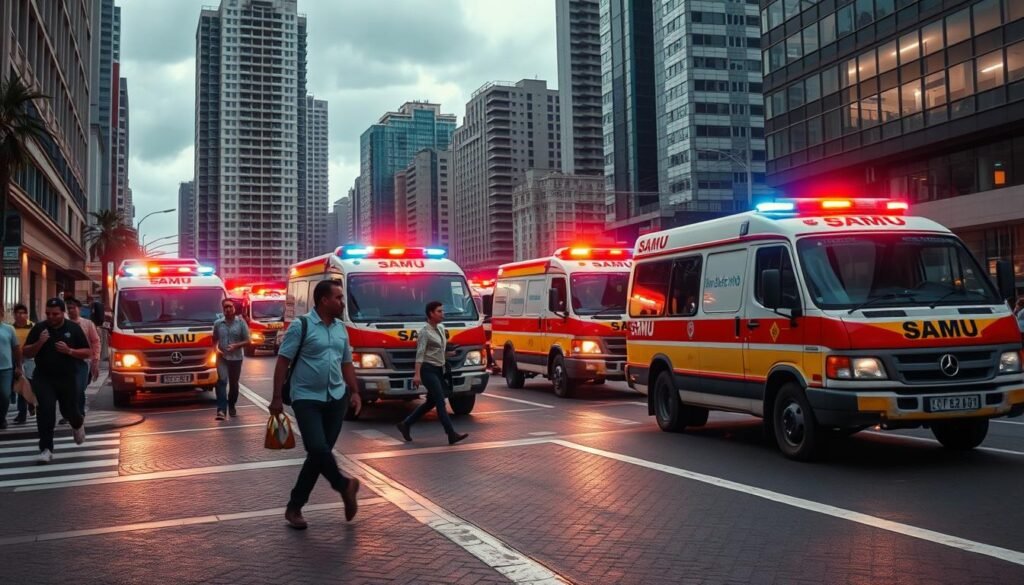
When seconds count, Brazil’s emergency response teams spring into action. The SAMU (Serviço de Atendimento Móvel de Urgência) handles 30 million calls yearly. Dial 192 nationwide for free, physician-staffed mobile ICUs.
This public system operates 24/7, stabilizing patients en route to hospitals. Teams tackle heart attacks, burns, and accidents. “SAMU bridges gaps in remote areas,” notes a 2023 health report. Yet 69% of northern towns lack nearby emergency facilities.
Private vs. Public Response
For faster aid, RESGATE offers private ambulances—but costs soar to $300+ per call. Key contrasts:
- SAMU: Free, but traffic delays are common in cities.
- RESGATE: Bilingual staff, shorter wait times.
Critical phrases to know:
- “Ajuda médica!” (Medical help!)
- “Dor no peito!” (Chest pain!)
“GIS data shows 70% of flagged municipalities sit 3+ hours from emergency care. SAMU’s helicopters help, but geography challenges remain.” —Health Ministry
Tip: Expats in rural areas should consider SOS International for air evacuation coverage. Urbanites? Save 192 in your phone—and learn cross-streets for quicker dispatch.
Conclusion
Brazil’s dual care systems—public SUS and private networks—work best when combined. Use SUS for basics like vaccinations, but invest in insurance for specialists. This balance ensures quality services without long waits.
Learning Portuguese unlocks better interactions. Even simple phrases help at clinics. Tools like Compara Saúde simplify insurance comparisons, saving time and money.
Adapt to the tropical climate with smart habits. Stay hydrated, use sunscreen, and embrace local wellness routines. From beach workouts to fresh açaí, Brazil offers vibrant ways to thrive.
Remember: Brasil cuida de você! (Brazil takes care of you). With preparation, you’ll enjoy a healthier, happier life here.
